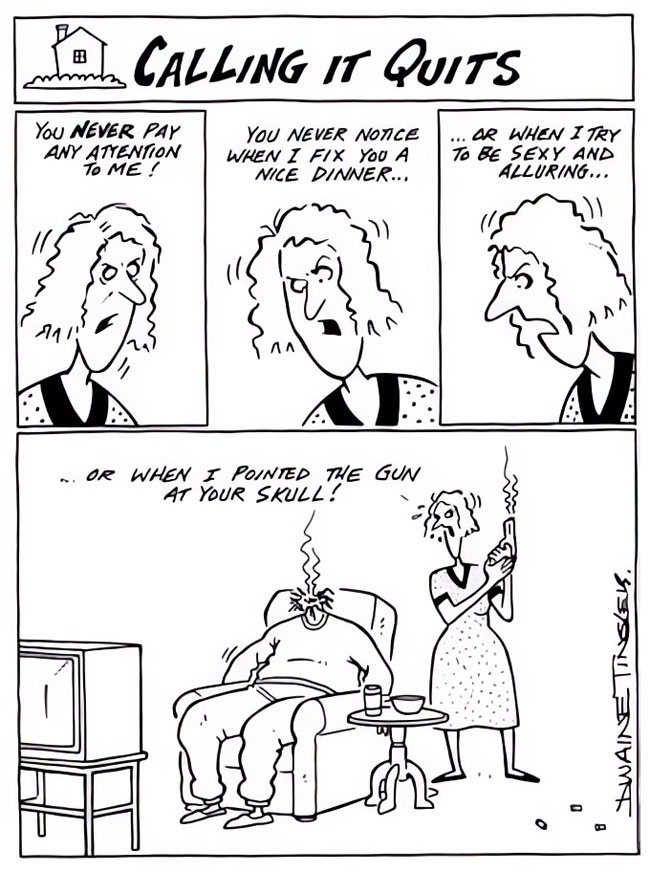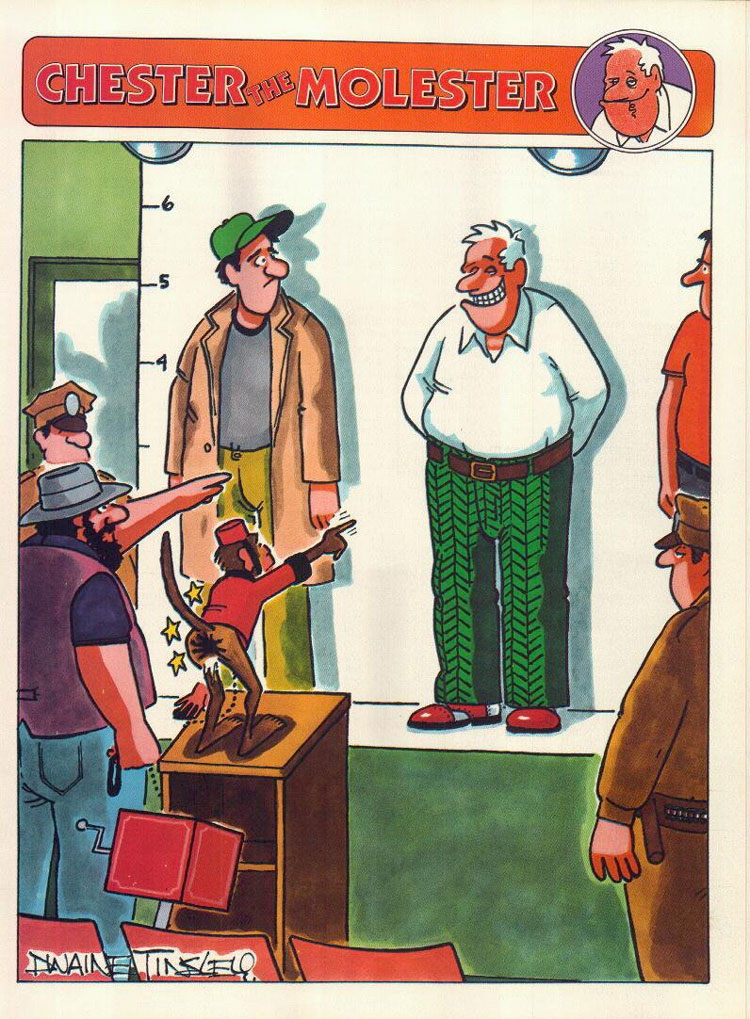Dwaine B. Tinsley was an American comic artist, whose signature series 'Chester the Molester' (1976-1989) was a mainstay in the pornographic magazine Hustler. Together with James McQuade's 'The Sexy Adventures of Honey Hooker' (1975-?) it was arguably its best known and longest-running comic series. A pitch black comedy full of offensive sex jokes, 'Chester the Molester' was controversial from the start. In a case of dark irony, Tinsley himself was later convicted of having molested his underage daughter. Though the case was later overturned on a technicality, there was never a retrial. The scandal has vastly overshadowed Tinsley's comics career, with many questions still unanswered to this day.
Early life and career
Beverly Dwaine Tinsley was born in 1945 in Richmond, Virginia. Since he hated the name "Beverly" he always called himself "Dwaine B.". He was raised in a dysfunctional family. His father was an unemployed ex-marine who suffered from alcoholism, as did Dwaine's mother. When the boy was three months old, his father caught his wife in bed with another man. He left her and to make ends meet, Dwaine's mother started a hairdresser store. The boy and his older brother were often put under the care of their grandparents. Sometimes they didn't see their mother for months. When Dwaine was nine, his mother remarried, but her new husband was another alcoholic. His mother had two more children, who both had fetal alcohol syndrome. As a teenager, Tinsley was arrested for juvenile crimes and spent time in reform school. At age 17 he dropped out of high school and moved to Washington D.C. There he lived on the street, taking drugs, including heroin. The addict earned money through burglaries and male prostitution. In November 1965, he and an accomplice were in Montgomery County, Maryland, where the police caught them stealing silverware and jewelry. They tried to escape, but Dwaine was shot in his ankle and arrested. On 11 March 1966, he was sentenced to six years in prison. He also spent 15 months in solitary confinement, because the guards thought he had instigated an inmate riot.
During his jail time, Tinsley graduated in Sociology through a correspondence course. After leaving prison in 1972, at age 23, he worked as a supermarket clerk, brick layer and door-to-door salesman. He got married, but after a year the relationship had sunk to such depths that he left his daughter and wife, who filed for divorce. In 1973 Tinsley moved to Atlanta to become a professional cartoonist. He had enjoyed drawing since he was five years old, with Siegel & Shuster's 'Superman' and Chester Gould's 'Dick Tracy' being his favorite comics. In the early 1970s, he primarily sold work to adult magazines like Cavalier, Gallery, Adam, Chic, Penthouse, Hugh Hefner's Playboy, San Francisco Ball and Screw. In the African-American magazine Players he published a comic strip titled 'Satch'. Comedian Richard Pryor read it and was surprised to find out it was drawn by a white cartoonist rather than a black one. Tinsley took it as a compliment.
Chester the Molester
In June 1974, publisher Larry Flynt established his own porn magazine, Hustler, which appealed to readers with more specific fetishes. Much like Hugh Hefner's Playboy it also offered articles about political and social topics, always from a left-wing progressive viewpoint. Hustler also imitated Playboy's tradition of erotic cartoons and comics, though with far raunchier content and black comedy. In 1976, Dwaine Tinsley's 'Chester the Molester' made his debut in Hustler's pages. The feature revolves around a man who likes to have sex with any women he encounters, regardless whether they're underage or not. Many episodes feature him thinking up plans to molest, strip, fondle, rape or exhibit himself to members of the opposite sex. In typical Hustler fashion the comedy was pitch black, but combined with graphic sex scenes. As a result, some readers had trouble accepting it as tongue-in-cheek comedy, since it was clearly also intended as pornographic material. Others felt it glorified rapists and violence against women.
To counter some of the criticism, Tinsley gave Chester a female sidekick called Hester, and retitled the series into 'Chester and Hester'. Hester was an ugly, middle-aged woman of whom it was never clear what her relation with Chester was. She was either his wife, a girlfriend or a family member. In 1978, editor Larry Flynt briefly became a born-again Christian, which had an impact on Tinsley's series, which changed its title into 'Chester the Protector'. Chester now became a hero who defended women and young girls from perverts like his former self. However, Flynt soon reverted to his former attitudes and became the same old cynical pornographer he was before. After this, Tinsley also had Chester leave the "right path" again.
Other cartoonists and comic artists who published in Hustler have been Aurelio Bevia, Mark Bode, Dave Choe, Gary Hallgren, Diego Jourdan Pereira, Hawk Krall, Aaron Lange, Tanino Liberatore, Don Lomax, Mats!?, James McQuade, Tayyar Ozkan, Steamy Raimon, Johnny Ryan, Adam Rust, Tom Simonton , Lorenzo Sperlonga, Ibrahim Tapa, Bob Vojtko, Skip Williamson and S. Clay Wilson.
Comic strip for Hustler.
Criminal conviction
In the 1980s, the religious right movement the Moral Majority, started to actively campaign against anything they deemed a loss of Christian values. Adult magazines like Hustler were expectedly a prime target. In 1984, the conservative, anti-pornography, anti-nudism and anti-LGBT activist Judith Reisman received a grant from the U.S. Department of Justice to complete a study of the cartoons in magazines like Playboy, Penthouse and Hustler. After two years of study, she released a nearly 1,600-page report in which she claimed that these erotic cartoons and comics often depicted "children in sexual and violent situations". She had found over 2,000 examples and directly linked them with having a negative influence on society. Interestingly enough, her results were not taken seriously by most of her fellow conservatives. Even the American University, in whose academic name she had conducted her research, refused to publish her manuscript. Many felt her claims were biased, lacked proof and the correlation between these cartoons and juvenile delinquency was dubious. Other people wondered why she needed so much taxpayers' money to write a simple report. Nevertheless, Reisman received enough publicity to cast these adult magazines in a negative light. In 1986, U.S. Attorney General Ed Meese launched a special government commission to combat pornography. However, he was sued for defamation by Playboy owner Hugh Hefner, lost his case and was forced to publicly clear Playboy of all accusations. In 1987-1988, Meese lost even more credibility when he was investigated by a federal grand jury during the Iran-Contra scandal.
While all this was going on, Dwaine Tinsley was arrested on 18 May 1989. His 18-year old daughter accused him of having molested her since age 11, when they were in a hotel. Tinsley later claimed about this particular incident: "I had been sleeping and in a semi-awake state he had felt 'a warm soft feminine body pushed against me. I cuddled and stroked the legs and hips. Suddenly I sprang awake and jumped. I realized it was my daughter! I was mortified... The whole episode bugged me for many years. I finally came to grips with the fact that I had done nothing wrong'." Dwaine's wife was an abusive mother, so her daughter had moved in with her father at age 13. From that moment on, the sexual abuse became more frequent, according to her. His daughter made a phone call to her father, which was wire-tapped by detectives in order to have a confession by him on tape. On the recording she tried to make him talk about "the sex", but Tinsley only made a vague comment that he "didn't want to discuss it over the phone" and that she should "stop thinking about it, because he didn't either and she was hurting him." Later Tinsley claimed that he was concerned about her cocaine habit and that it wasn't the first time that she had tried finding ways to hurt him, so he let her comments about incest just fly by, without denying them. His daughter also claimed that many of the scenes in his comics were directly inspired by things he had done to her. The fact that Tinsley had once said to his co-workers: "You can't write about this stuff all the time if you don't experience it" was additionally held against him.
In December 1989, it came to a trial. With no hard evidence, it was Tinsley's word against his daughter's. On 5 January 1990, the cartoonist was found guilty and sentenced to six years of prison. Behind bars he kept drawing new episodes of 'Chester the Molester'. However, in February 1992, his conviction was unexpectedly overturned. During the trial, several of Tinsley's Hustler cartoons had been used by the prosecution to paint him in a more negative light. The judge now ruled that this had been gratuitous and had unfairly biased the jurors. Therefore Tinsley was freed. At the request of the prosecutor, a request for a retrial was dropped, because Tinsley's daughter had "struggled over the years to overcome the personal problems that resulted from her abuse and does not want to have them brought up again." The downside of this was that neither party, not Tinsley, nor his daughter, ever had a chance to clear the matter once and for all. Either way, they never spoke to each other again. In 2000, Dwaine Tinsley died from a heart attack.
In 2008, lawyer Bob Levin, known for his work for the comics new magazine Comics Journal, wrote a book about the entire case, 'Most Outrageous: The Trials and Trespasses of Dwaine Tinsley and Chester the Molester' (Fantagraphics Books, 2008). In this work, he investigates Levin's background, his daughter's life and the way the trial was conducted. Levin has cast doubt over the accusations against Tinsley. He discovered that a house search had found no evidence of child pornography in Tinsley's home. He also points at the fact that the cartoonist had actually taken his daughter to a psychotherapist long before the trial, which shows genuine concern for her well being. Levin also has a strong belief that the entire scandal was a trial by media, strongly influenced by prejudices of people who already hated what Hustler represented. Since the magazine already had a bad reputation in certain circles and the black comedy of 'Chester the Molester' was taken at face value by people who never read Hustler, Tinsley arguably couldn't escape being pigeonholed as a deranged pervert.





